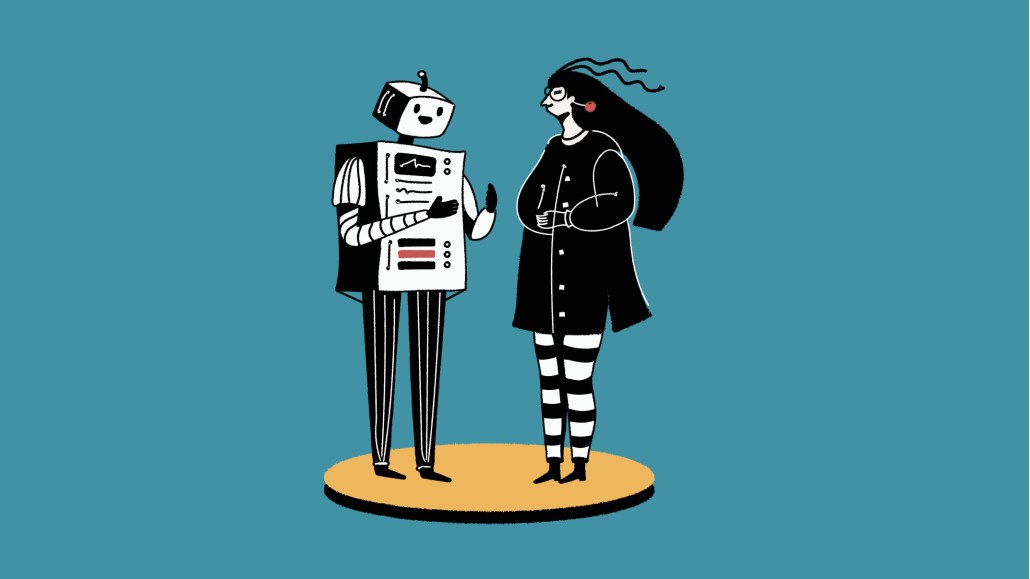Secure your place at the Digiday Media Buying Summit in Nashville, March 2-4
Academia-industry partnership eyes talent development in AI-centric creative economy

This article was first published by Digiday sibling Work Life.
The creative industries are experiencing their most consequential transformation in decades, and the new Centre for Creative AI — launching this fall via a partnership between University College London, the Royal College of Art and The Brandtech Group — represents a paradigm shift in how creative talent is developed in an AI-integrated economy.
For leaders managing creative teams or seeking out talent in fields including media, entertainment, fashion and design, the initiative promises critical insight into the evolving skill set organizations will need and how to cultivate it.
Mark Eaves, founder of Brandtech agency Gravity Road and a key architect of the Centre, notes the rapid shift in organizational attitudes toward AI. “It’s amazing how quickly it’s moved from being a novelty to rapidly becoming part of the creative instinct itself,” he says. Unlike previous technological disruptions like mobile or social media, which took years to reach boardrooms, AI is different. Eaves calls it “a horizontal technology going across whole businesses,” with CEOs “already well aware of how it’s affecting everything from the supply chain to product design and marketing.”
That high-level awareness creates opportunity and urgency for leaders, with the organizations that treat AI merely as a productivity-boosting or cost-cutting tool at risk of falling behind those that see it more as a catalyst for reinventing how creative work gets done.
Traditionally, creative industries have operated in silos: specialists with a narrow skill set passing work among departments. AI is dismantling those barriers, and fast. As Eaves explains, “A great creative now is someone who can orchestrate various elements and make them all sound great.”
That evolution demands a new kind of talent recruitment, emphasizing candidates who can synthesize different elements intuitively, work across broad creative disciplines and demonstrate what Eaves calls “critical thinking, judgment and taste” — skills that become more valuable as AI handles basic execution.
The Centre’s backing from corporations including Diageo, Unilever and Snap reflects a growing recognition that workforce transformation is elemental. Esi Eggleston Bracey, Unilever’s chief growth and marketing officer, frames it as “stepping into a whole new era of marketing where AI isn’t just changing our tools, it’s reshaping how we think about creativity.”
Valentina Culatti, global director of creative strategy and production at Snap, emphasizes the generational dimension: “Young people aren’t just early adopters of AI; they are creative and innovative thinkers who are continually shaping the future of applied AI.” For HR leaders, that points to the importance of engaging with emerging talent who already speak AI fluently while upskilling existing teams.
The Centre’s model offers several lessons for HR leaders developing their own AI integration strategies, among them:
Embracing cross-functional collaboration. The Centre deliberately brings together technologists, artists and business leaders, and HR departments may take a cue and facilitate similar cross-pollination within their organizations, breaking down silos between creative, technical and strategic roles.
Prioritizing learning agility over specific skills. Rather than recruiting for today’s AI tools, recruiters may opt to focus on candidates who demonstrate adaptability, curiosity and the ability to synthesize complex information — meta-skills that will remain valuable as technologies evolve.
Creating structured experimentation opportunities. The Centre will function as a sort of “playground” where serious exploration happens, but in a structured way. HR leaders can create similar “safe spaces” for teams to experiment with AI tools without the pressure of immediate commercial outcomes.
Investing in critical thinking development. As Eaves notes, “skills of critical thinking and judgment are going to be really central components of success in the creative industries,” as those uniquely human capabilities become more valuable with AI coming to handle routine tasks.
The Centre represents more than just a conduit for workforce development transformation — it is also about maintaining competitive advantage in a global creative economy. (In the U.K., creative industries are the fastest-growing contributor to export markets.) For HR leaders everywhere, the message is that organizations successfully integrating AI into their creative processes will reap results.
The Centre’s chair, Alex Mahon, former CEO of the U.K.’s Channel 4, emphasizes that “Gen AI is a powerful new frontier for creativity, but its true potential lies in how we choose to use it” — and that choice starts with how organizations prepare their workforce.
The question is not whether AI will transform creative work — that’s already happening. The question is whether organizations will help lead the transformation that’s already underway or be left behind by it.
More in Marketing

Future of Marketing Briefing: AI’s branding problem is why marketers keep it off the label
The reputational downside is clearer than the branding upside, which makes discretion the safer strategy.

While holdcos build ‘death stars of content,’ indie creative agencies take alternative routes
Indie agencies and the holding company sector were once bound together. The Super Bowl and WPP’s latest remodeling plans show they’re heading in different directions.

How Boll & Branch leverages AI for operational and creative tasks
Boll & Branch first and foremost uses AI to manage workflows across teams.







